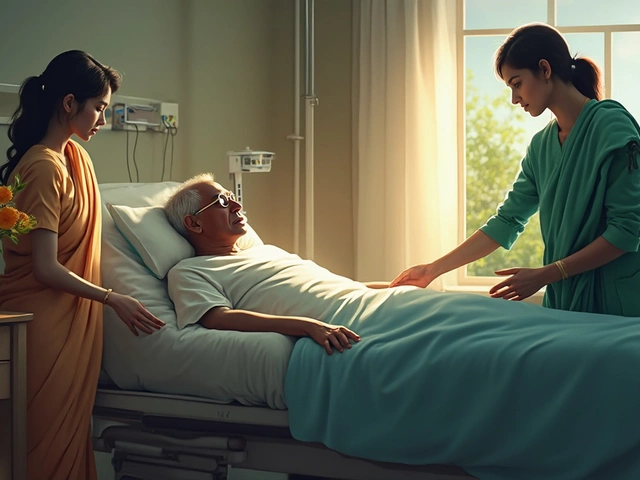So, you’ve recently undergone open-heart surgery, and you're itching to get back to normal life, which includes driving your car. Let’s tap the brakes for a minute and dive into what you really need to know about getting back on the road.
First off, each person's journey to recovery is different. The type of surgery you had, along with your overall health, plays a big role in how soon you can drive again. Typically, doctors suggest waiting around four to six weeks before you slide into the driver’s seat. But hey, that’s a general guideline. Your doc might give you the green light earlier or later depending on how you're healing.
Why wait, you ask? Well, it’s all about safety. After heart surgery, your body is busy healing, which means your reaction times could be slower, not to mention the possible need to avoid sudden movements or strain. Plus, medications you're on might make you sleepy or less alert—definitely not what you want when there's traffic to deal with!
- Understanding Recovery Time
- Factors Affecting When You Can Drive
- Tips for Safe Travel After Surgery
- When to Seek Medical Guidance
Understanding Recovery Time
Getting back on your feet after heart surgery isn't something you can rush. You need to give your heart and body time to heal. Typically, recovery time after such a procedure plays a big role in when you can safely start driving again.
Right after surgery, expect to stay in the hospital for about a week. During this time, healthcare providers closely monitor your heart function and overall recovery. Once home, you'll likely have a few weeks of taking it easy. A key part of recovery is attending cardiac rehabilitation, a program that helps strengthen your heart through supervised exercise and education about heart-healthy living.
According to the American Heart Association, most folks may need about six weeks before getting back behind the wheel. This time span allows the sternum—a bone that's often cut during surgery—to start healing up. It's crucial because your sternum supports your chest and plays a role in helping your arms move when driving.
Recovery can depend on a few factors:
- Type of surgery: Whether it was a bypass or valve repair, different surgeries have different recovery timelines.
- Your overall health: Pre-existing conditions like diabetes or respiratory issues could slow things down.
- Complications: Any issues during or after surgery might require more healing time.
It's essential to consult your doctor before deciding to drive. They might suggest doing some light physical activities before taking the driver's seat to ensure you're ready.
Heart surgeries aren’t one-size-fits-all, so always lean on your healthcare provider's knowledge and guidance as you map out your return to driving.
Factors Affecting When You Can Drive
Getting back behind the wheel after open-heart surgery isn’t just about marking time on the calendar; several factors come into play. Let's break it down so you're fully aware of what could affect your ability to drive safely.
First up is the surgery type. For instance, if you had a bypass versus a valve replacement, your recovery might differ. Bypass surgery often involves more trauma to the chest, requiring a little longer to heal before you’re cleared to drive.
Your general health and fitness level matter a lot, too. If you were in good shape before the surgery, you might find yourself bouncing back quicker compared to others. Your body’s ability to heal is closely tied to how well you’ve been treating it all along.
Your healing process is another critical factor. Are you experiencing any post-surgery complications? Things like infections or slow healing can delay your return to driving. It's one of those cases where listening to your body really pays off.
Don’t forget the medications you're on. Some, especially painkillers, may impair your reaction time and concentration. It’s super important to discuss any side effects with your doctor so you know when it's safe to drive.
And let’s not overlook advice from your healthcare provider. These folks know your case inside out, and their guidance is tailored to your specific situation. If they say wait, it’s wise to follow that, even if you’re feeling impatient.
- Type of heart surgery
- Overall health and fitness
- Progress of healing and recovery
- Current medication side effects
- Doctor’s personalized recommendations
Every one of these factors blends together to form a timeline for when you can hit the road again. Be patient with yourself and take it one day at a time. Regaining health is a marathon, not a sprint.

Tips for Safe Travel After Surgery
Alright, so you're getting closer to hitting the road again after your heart surgery. Here’s some practical advice to ensure your drive is both comfy and safe.
First up, let's talk about planning. Before you head out, make sure you’re ready for the journey. This means having all your meds handy, dressing in comfortable clothing, and plotting out your route. No last-minute scrambling!
While you may be excited to go solo, consider having someone tag along for those first few drives. It’s always a good idea to have another pair of eyes and hands in case you need help.
Here are a few key tips to keep in mind:
- Take Breaks Often: If you're planning on traveling for more than an hour, schedule regular breaks. Getting out, stretching, and taking short walks helps prevent blood clots which can be a real risk post-surgery.
- Avoid Peak Traffic: Driving in heavy traffic can be stressful and overwhelming, especially when you're still healing. Pick quieter times to hit the road.
- Position Your Seat Comfortably: Make sure your car seat is adjusted to a comfortable position. Sitting too upright or hunching can strain your chest and make breathing harder.
- Wear Your Seatbelt Properly: You don’t want the belt rubbing against your chest incision. Use a small cushion or a seatbelt pad to make it more comfortable.
- Be Cautious with Medications: Some meds can make you drowsy. Check with your doctor about which medications might affect your driving abilities.
Want a little stat to back up why this is crucial? Around a third of people who've had open-heart surgery report feeling more fatigued than expected when they first drive again. So, it’s not just you if you feel zapped after a short trip.
Lastly, pay attention to your body. If something feels off, don't push it. Your well-being comes first.
When to Seek Medical Guidance
Knowing when to check in with your doctor after open-heart surgery is crucial, especially when you're thinking about resuming activities like driving. But how do you know when it's time to call your doctor?
First off, if you’re feeling unusual pain, it’s time to pick up the phone and give your doctor a buzz. Pain might be your body’s way of saying something isn’t right. Also, if you experience any dizziness, shortness of breath, or sweating more than usual when you try to get in the car, these are red flags. It’s definitely not something to ignore!
Other signs include swelling or redness around your incision site, or if you notice any fluid leakage. These could suggest an infection, and nobody wants that postoperative hassle. Trust me, it’s better to be safe than sorry here.
Your doctor's guidance is not just about managing complications, but also about understanding how medications—like blood thinners or painkillers—might influence your ability to drive or travel after surgery. Sometimes, what seems minor to you can be significant in the grand scheme of your recovery.
A quick look at your post-surgery appointments schedule might help too. If it's been a while since the last one, consider scheduling a checkup before you plan on hitting the road. Your healthcare provider will appreciate the proactive approach, and so will your heart.
Here’s a handy list of indicators that warrant medical attention:
- Increased pain or discomfort.
- Dizziness or lightheadedness.
- Unusual shortness of breath.
- Swelling or redness around the incision.
- Uncommon fatigue or weakness.
Remember, it’s essential to listen to your body and consult medical guidance when things feel off. It's all about ensuring a smooth and safe recovery, so don’t hesitate to reach out to the professionals.



